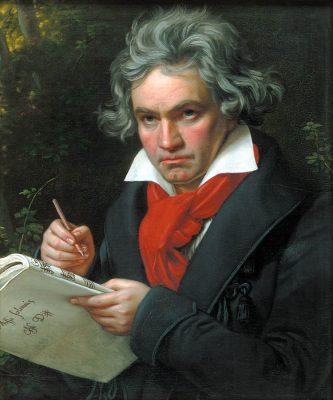Great (Previously) Unreported Moments in Entertainment History
Of course, everybody knows the important facts about entertainment today — we’ve got so many terrific magazines to tell us about them — but little is known about the pop culture tales of yesteryear.
However, recently I sought to rectify that. I put on my Indiana Jones hat, searched for aged scrolls, dug into dusty tomes and haunted musty libraries looking to bring you the stories you just won’t get anywhere else. And here they are. Here are the last millenium’s great untold moments in entertainment, in no particular order:
* 1450: Johann Gutenberg invents the printing press, allowing the printed word to be distributed to people for the first time and opening up lines of communication that would ultimately connect the people of the world. When asked why he strove to complete such an invention, he said, “So my distant relation Steve would have easier-to-read scripts during the creation of the fine film “Three Men and a Little Lady.”’
* 1528: In a move that would have far-reaching consequences into our own era, Nostradamus, an out-of-work actor far beyond his prime, gets into the profitable world of psychic prediction.

* 1942: After moving into an old house, a young J.D. Salinger peels away a floorboard and discovers a handful of musty journals. The diaries, by one H. Caulfield, contain a smattering of stories about precocious youths from New York.
Mysteriously, Salinger drops out of brick-laying school the next day and embarks upon a literary career.
* 1889: Poor, destitute painter Vincent Van Gogh, in a pique of rage, cuts off his ear. The scene is witnessed and captured on canvas by his apprentice, Vincent Van Tarantino.
* 1832: Up-and-coming writer Edgar Allan Poe, up until this point a beaming optimist, falls into a dark, never-ending depression when he isn’t named Sexiest Man Alive by American Persons magazine. “I shall never amount to anything now!” Poe moans. “And to think, all I ever wanted was someone to name a sports team after one of my poems!”
* 1867: After failing at the family business, Mark Twain decides to take up writing full time. His final act as CEO is passing off half of his white suits and the family’s last remaining fried chicken franchise to his brother, Colonel “Sandy” Twain.
* 1957: Dr. Seuss decides against calling his new character “The Cat in the Black Leather Chaps” and goes with a hat instead.

Beethoven, possibly during the composition of his classic, `Double-Jointed Gretchen.’
* 57: After being beaten in the straw poll ratings for years by the Octavian Entertainment Coliseum’s “Must See Chariot-Races!” and the Augustus Revelry Group’s “Night of Greek Tragedies featuring Cassiopeia Aniston,” the chairman of the Nero Entertainment Network hits upon a successful formula with the programs “When Good Lions Go Bad” and “World’s Funniest Orgies.” The immortal demon, who would ultimately move to Australia and name himself “Rupert Murdoch” would later revisit the ideas to great ratings success for an invention called “telly-vision.”
* 1694: Attendance at the Sistine Chapel plummets when ultra-conservative Roman tabloids report that the painter of its ceiling, Michelangelo, was, in fact, gay. However, church public relations officers, thinking quickly, appease the faithful and bring back the crowds after telling people they won’t be damned to hell if they simply don’t look up.
* 1836: An influential piece of pre-historic fine art is discovered when explorers find a painting done with berry juice and mud on a stone wall in Turkey. The early artwork, allegedly titled “Dinosaurs Playing Poker,” is later purchased by GoldenPalace.Com for $3 million.
* 1941: The legendary film “Citizen Kane” is nearly scrapped after test screenings prior to its release reveal that people think the movie is “boring, dumb and not wacky enough.” Audience members’ surveys suggest that director Orson Welles should add “more explosions, a couple of car chases, a zany old lady with a foul mouth and plenty of cute little dogs.” Welles decides to ignore the valuable input. Good decision? Bad decision? You decide…
* 1810: Concerned Citizens for A Moral Austria pushes to ban a famous Beethoven work, forcing the composer to eventually snip all of its offensive lyrics and release the piece as an instrumental. Thus, from that time forward, the popular song “Double-Jointed Gretchen” is known as “The Fifth Symphony.”
And now you know…the rest of the stories…
copyright 2023 Sean Leary / for more writing and stuff you really, truly, simply can’t live without, please see www.seanleary.com









